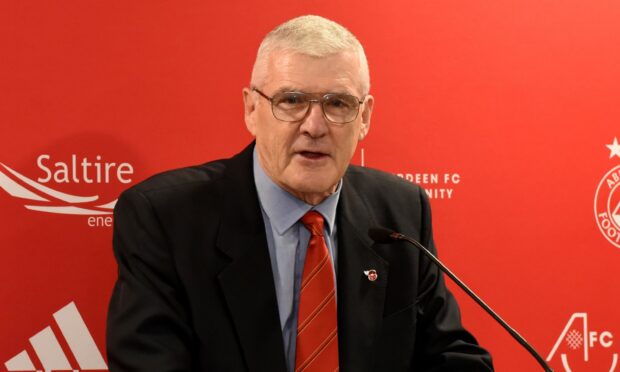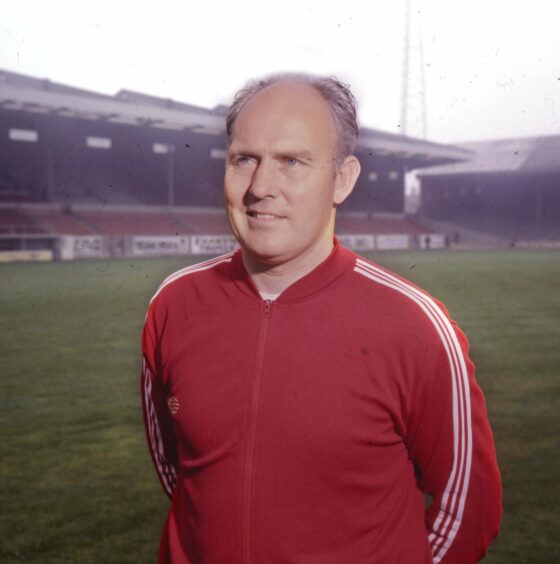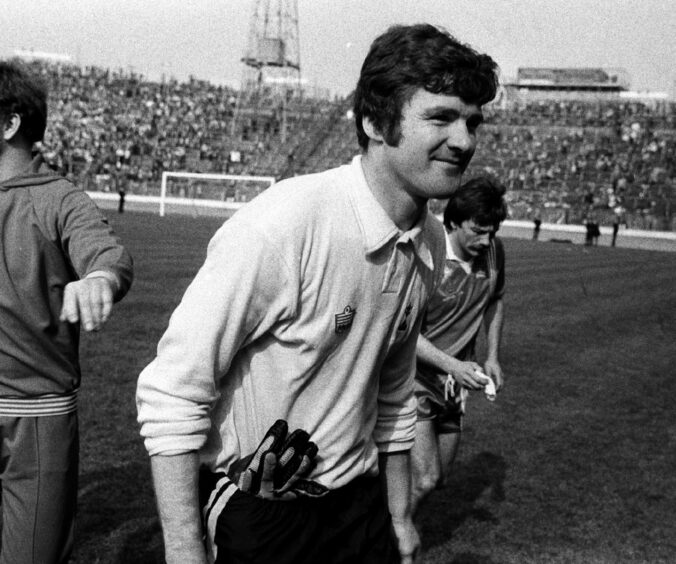Former Dons goalkeeper Bobby Clark believes changing the culture in the Aberdeen dressing room is key to the club’s hopes of putting a tough couple of years behind them.
Clark, who played for Dons from 1965 to 1982 where he won all three domestic trophies, insists stability in the Pittodrie dressing room is vital following two years of significant change within the first team squad.
Aberdeen have utilised their full quota of loan players by having eight in the current squad and, while Clark understands why the Dons felt the need to freshen up the squad last month, he believes short-term fixes are not the solution.
The former Scotland goalkeeper said: “I read 17 new players came in this season and some have already gone out. There could be 16 going out in the summer.
“It’s very difficult to create a culture in your dressing room with so many loan players.
“It’s easy for them to think: ‘I’m only here on loan and I’m moving on.’ It’s easier for a loan player to chuck it when the going gets tough.
“In my era, you didn’t have loan players.
“It’s very different now and it adds another layer of difficulty for managers in trying to put a squad together.”
Clark recalls George Murray’s caretaker stint in charge
The Dons are searching for their third manager in two years after the last two – Jim Goodwin and Stephen Glass – lasted less than 12 months in charge in their respective tenure.
Barry Robson is in interim charge, while the recruitment process is carried out.
Clark went through a similar experience during his time at the club when George Murray took charge for four games in the 1975-76 season following Jimmy Bonthrone’s resignation.
He said: “George was Jimmy’s assistant so were fortunate in that things didn’t change very much.
“When I was there Aberdeen never sacked a manager – Eddie Turnbull left for Hibs and Jimmy resigned as he was feeling the pressure.
“It was the first year of the 10-team Premier League and two were relegated, so it was a pressure cooker that season.
“The manager feels the pressure often more than the players and I think that was the case with Jimmy.
“You’re always sorry when a manager goes out the door as you always feel as if you should bear some of the responsibility.”
Murray was a trusted lieutenant for Dons bosses – but end of his interim spell was tough moment for Clark
Clark’s hopes of impressing new boss Ally MacLeod were dashed when MacLeod had barely gotten used to his new surroundings.
He said: “I tore my medial ligament in the Motherwell game with Ally sitting in the stand. I had to have meniscus surgery at that time and missed a big chunk after that game.
“It was just the way I landed, but I tore the ligament and nicked the cartilage so that’s my main memory of George’s brief spell in charge.
“George had been a player and player-coach for Jimmy, and stayed on as coach for Ally and for a little bit with Billy McNeill.
“Jimmy was a lovely man and I often felt the Eddie and Jimmy combination was very good for us.
“Eddie didn’t trust many people, but he did trust Jimmy.
“Jimmy softened Eddie – he was a great coach, but tough, and Jimmy had a softer side, so they were a good partnership.
“But when Ally breezed in he was certainly different from Jimmy and Eddie before him.
“He certainly did a great job as far as getting the team going again and, of course, we went from fighting relegation to lifting the League Cup the following season.”
Clark’s coaching inspiration started at Pittodrie
Clark’s time at Pittodrie led to him developing his own desire to become a coach and he credits the guidance of his fellow coaches at the club as being crucial in his own development.
He said: “My last game really was winning the league in 1980 as I had to have back surgery and during that period I couldn’t do a lot.
“After I started coaching at the club, I worked with Lenny Taylor and Teddy Scott. I coached the youth team with Lenny and went with Teddy and the reserves.
“Teddy was a good person to learn from and I learned a lot of good things from him.
“One time he had to go with the first team and I remember taking the reserves for a game.
“I was a caretaker for Teddy with the reserves and was given tablets to take for my back so I could play in the game I was coaching the team for.
“After that I was always a head coach in my own right in Zimbabwe, New Zealand and the college scene in the US.”




Conversation